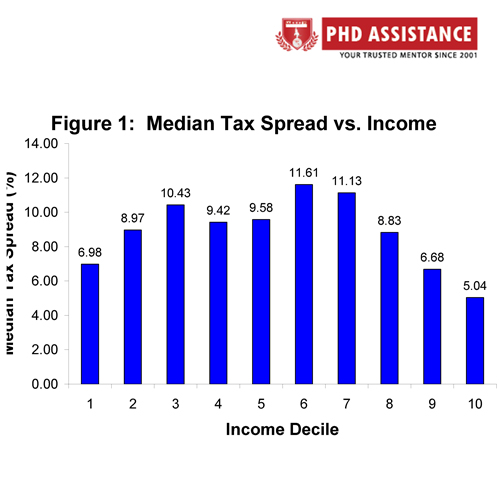Taxes and Entrepreneurship Research: Future Agenda for PhD Scholars
Introduction
The possible impacts from tax policies on any entrepreneurial initiatives have drawn much attention from policy makers as well as Researchers for some time now. Innovation, as well as entrepreneurship are vital components of the macro-economy and small businesses do contribute in a substantial manner towards employment and growth of the economy. Acknowledging these aspects, policy makers at every level of government are said to have an extended history of trying to motivate small business initiatives on the basis of several tax related policies [1]. The level to which such policies could prove to be impactful would depend on the degree to which entrepreneurs would actually respond to taxes. Through this review, an attempt is made to Review extant Literature within this domain and outline the agenda for PhD scholars for undertaking research in future.
PhD Assistance experts have experience in handling dissertation and assignment in business and management research with assured 2:1 distinction. Talk to Experts Now

Taxation Policies and Entrepreneurial Opportunities
Superficially, there is no clarity as to tax policies has the propensity to improve opportunities for entrepreneurs, act as a deterrent to success in entrepreneurship, or make no impact whatsoever. Conventional types of practical income related taxations produce incentives that are possibly offsetting. Progressive rates within taxes lower the returns for achieving success in entrepreneurship. However, at the same time, it also acts as an insurance against losses [2]. In addition, the conventional structure of income tax offers greater opportunities for avoiding tax and evasion for individuals who are self-employed or many others whose incomes are not reported by a third-party. Thus, possibly augmenting returns from entrepreneurship. Instead, intricacies within the code of tax tend to produce substantial costs in terms of compliance and administration, which has high scope to be aggravated with consistent changes in the code of tax [3]–[6]. The bottom-line here is that though it would be tempting to assume that incentives like lowering of taxation rates could make a positive impact on small entrepreneurial initiatives, there is no conclusive Solution from the Theoretical and empirical literatures.
PhD Assistance has vast experience in developing dissertation research topics for student’s pursuing the UK dissertation in business management. Order Now
Common Challenges with Taxation and Small Entrepreneurship
PhD scholars have been challenged with diverse problems in terms of data as well as estimation as per evidence presented through literature. Therefore, it becomes imperative to succinctly deliberate such issues, prior to proceeding ahead. With regards to data, as it has been referred to above, it is frequently very challenging to acquire data that is useful for both taxations related policies as well as entrepreneurship [7]. PhD scholars often have to tackle the question keeping in mind a specific definition of entrepreneurship or small business activity in mind, however, proxies that are available would warrant the need for certain compromises in almost all studies. Though the data that is presently available is much better than what existed earlier, the fact of the matter is that all measures of small business activity are in some or the other sense, proxies for what a PhD scholar would actually have in mind [8]. This could prove to be very critical for PhD scholars in terms of conducting an empirical analysis, particularly if one is worried about bias from proxies to arise or more conventional types of measurement related errors. PhDAssistance assists you in developing unique and unexplored research topics on business and management for your UK dissertation.
Future Directions
On the whole, Latest Literature on Entrepreneurship and taxation hints at a negative association between tax rates and measures related to entrepreneurship with the most consistent outcomes from modifications in rates of corporate taxes. Evidence derived most recently from international literature also directs at a negative association between complexity and progressivity and an array of entrepreneurship measures [9]. A very critical warning to such generalizations could be observed through the United States based panel data studies on rates of federal taxes. Studies on the basis of survey related information tend to provide continuous positive association amongst entrepreneurship and taxation, whereas analysis on the basis of data pertaining to tax returns would suggest a negative impact that is more consistent with international literature. This would also be frequently utilizing administrative data. Considering that all available measures related to entrepreneurial initiatives are innately imperfect, it provides tremendous scope for PhD scholars in future to investigate it. Therefore, PhD research scholars in future need to carefully take into account diverse options with a view to analyse the strength of primary findings and sensitivity to alternative assumptions. In a world that is perfect, administrative data, along with matched survey would enable reconciliation amongst seemingly divergent outcomes from small entrepreneurial income studies and studies on self-employment.
References
[1] Dondena, “Literature review on taxation, entrepreneurship and collaborative economy,” 2017. https://www.case-research.eu/files/?id_plik=5362.
[2] N. Elert, M. Henrekson, and M. Sanders, “Taxation and Entrepreneurship,” 2019, pp. 35–51.
[3] P. Aghion, U. Akcigit, M. Lequien, and S. Stantcheva, “Does Self-Employment Respond to Simpler Fiscal Incentives? Evidence from France,” Working paper, 2017. [Online]. Available: http://www.ufukakcigit.com/s/AALS_Self_Employed_v19.pdf.
[4] P. Braunerhjelm and J. E. Eklund, “Taxes, tax administrative burdens and new firm formation,” Kyklos, vol. 67, no. 1, pp. 1–11, Feb. 2014, doi: 10.1111/kykl.12040.
[5] P. Braunerhjelm, J. E. Eklund, and P. Thulin, “Taxes, the tax administrative burden and the entrepreneurial life cycle,” Small Bus. Econ., vol. 56, no. 2, pp. 681–694, Feb. 2021, doi: 10.1007/s11187-019-00195-0.
[6] R. Weber, “The Effect of Tax Code Complexity on Entrepreneurship.,” J. Priv. Enterp., vol. 30, no. 2, 2015, [Online]. Available: http://journal.apee.org/index.php/ajax/GDMgetFile/2015_Journal_of_Private_Enterprise_vol_30_no_2_parte5.pdf.
[7] N. Arm, “Essays on Entrepreneurs and Taxation,” 2018.
[8] W. G. Gale and A. A. Samwick, “Effects of income tax changes on economic growth,” Econ. Stud. https//www. brookings. edu/wpcontent/uploads/2016/06/09_Effects_Income_Tax_Changes_Economic_Growth_Gale_Sa mwick. pdf, 2014, [Online]. Available: https://books.google.com/books?hl=en&lr=&id=ndYWDgAAQBAJ&oi=fnd&pg=PT25&dq=Effects+of+Income+Tax+Changes+on+Economic+Growth+&ots=ng-fQhsOgU&sig=MJHbIoC1rncUJOlmM0BmwPcoLOs.
[9] V. Ratten, “Future research directions for collective entrepreneurship in developing countries: a small and medium-sized enterprise perspective,” Int. J. Entrep. Small Bus., vol. 22, no. 2, p. 266, 2014, doi: 10.1504/IJESB.2014.062505.



